Finding the best road bike saddle is one of the important ways of unlocking greater comfort on the bike.
Our team of expert testers have ridden a huge range of saddles, in various shapes and sizes. Based on that wealth of experience, we’ve assembled a list of what we think are the most comfortable bike seats for the best road bikes.
While this includes options that are suitable for men and women, we also have a dedicated guide to the best women's road bike saddles and women's mountain bike saddles.
If you want to know more about picking the right bike seat for you, check out the buyer's guide at the end of this article.
Editor's note: This list was updated on 3 January 2025.
Best road bike saddles in 2025, as rated by our expert testers
With so many road bike saddles on the market and so much choice, we’ve split our pick of the best road bike saddles into different price categories, from performance-oriented saddles that cost around £200 to budget-friendly saddles under £100.
Keep scrolling to see all the saddles or click on the links below to skip to the different price points:
Best road bike saddles for £100
Brooks Cambium C15 road saddle
SQUIRREL_TEXT_13092697
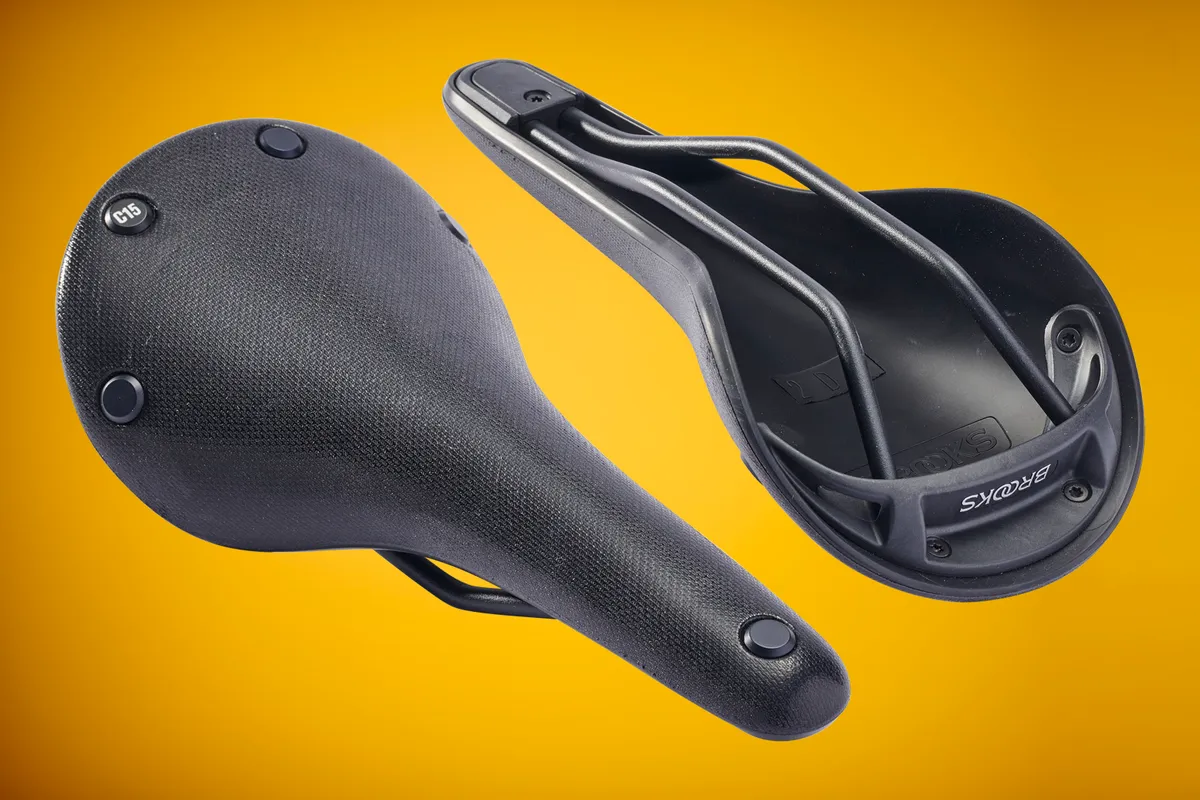
- £100 / $130 / €120 as tested
- Pros: Solid, supportive seat; multi-surface potential
- Cons: Firm
The Brooks Cambium C15 feels solid and there is little give. But while riding, you don’t notice its weight.
The saddle's nylon-covered hard vulcanised rubber shell is suitable for touring and commuting. And it provides enough shock absorption for venturing onto gravel.
The firmness, though, means the Cambium C15 is not cut out for pacy road riding.
SQUIRREL_13092697
San Marco AllRoad Open-Fit Dynamic
SQUIRREL_TEXT_13083394
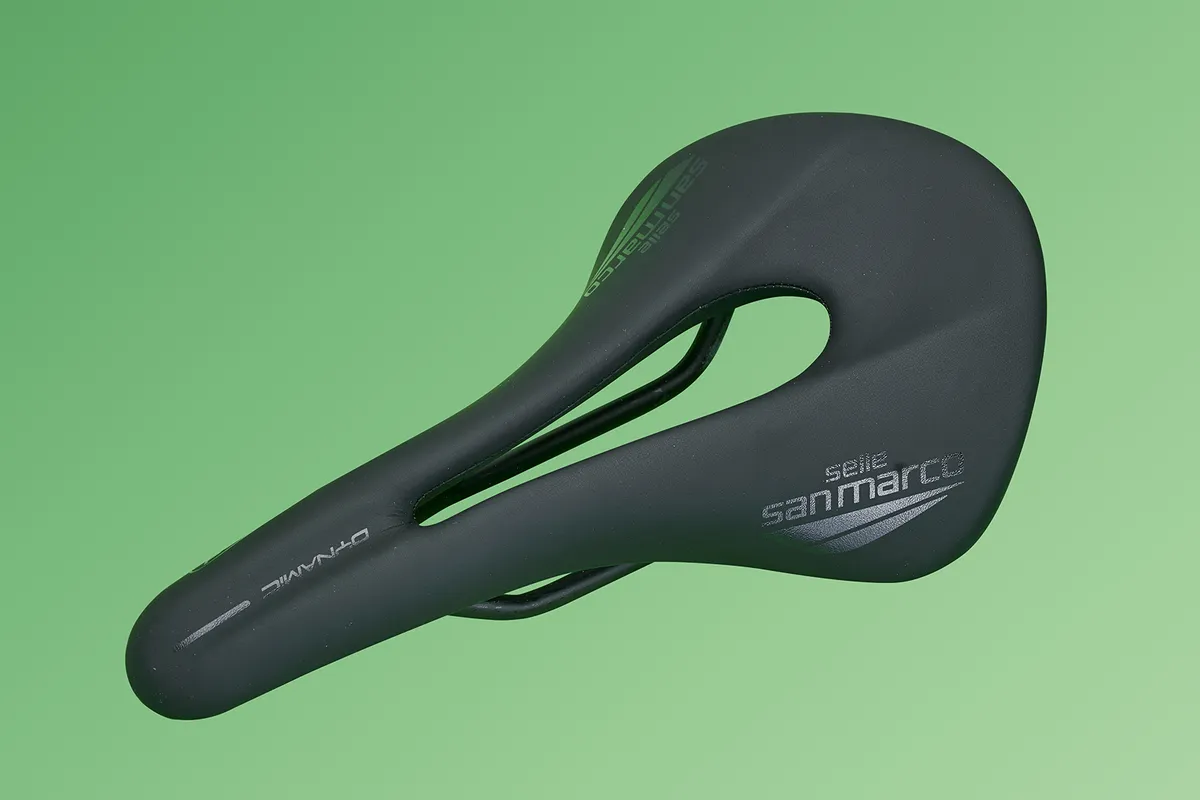
- £75 / $90 / €99 / AU$131 as tested
- Pros: Grippy, supportive saddle
- Cons: Padding could be thicker
The San Marco AllRoad Open-Fit Dynamic saddle's comfort across a range of terrain and riding positions comes from well-distributed padding and ergonomics. The long central cut-out flexes to increase cushioning.
While not a short saddle, the San Marco perch has a raised rear that, along with the cover material, prevents you from sliding about.
Our tester also found the rear tilt improved pedalling efficiency, while the long, thin saddle tip didn't impede the pedal stroke.
A combination of alloy rails and carbon shell bring the San Marco AllRoad Open-Fit Dynamic's weight to a competitive 196g on our scales.
SQUIRREL_13083394
Specialized Bridge Comp with MIMIC
SQUIRREL_TEXT_13090741
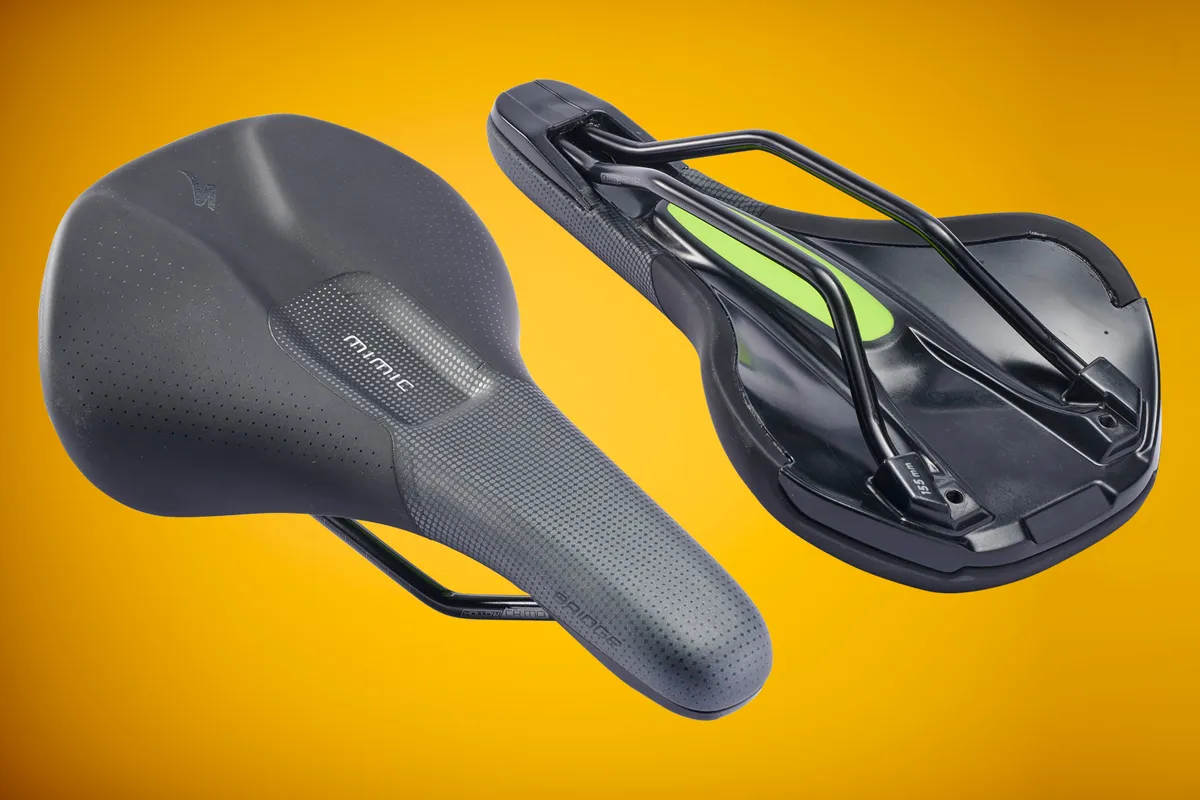
- £90 / $140 / €120 / AU$150 as tested
- Plush foam
- Available in three lengths
Specialized’s Bridge Comp with MIMIC saddle has more padding than others – notably around the nose – and a pressure-relieving channel, with Specialized’s MIMIC technology.
Specialized says the Bridge Comp saddle also uses softer foam throughout than on a lot of saddles.
Our tester found the low- and medium-density padding across the rear offered excellent support when riding upright. The softer nose helps when riding more aggressively.
SQUIRREL_13090741
Specialized Power Expert
SQUIRREL_TEXT_13076241
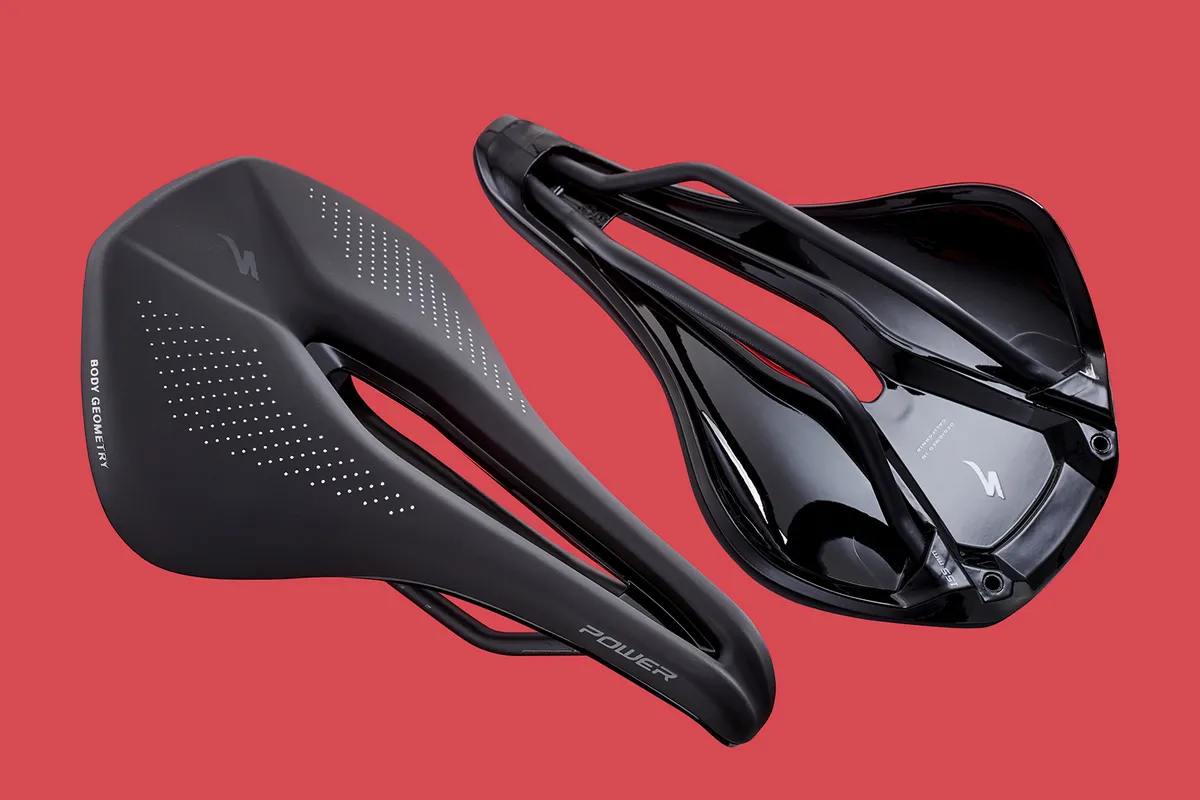
- £105 / $160 / €130 as tested
- Choice of widths
- Good for riding in aggressive positions
One of the initiators of the short-saddle trend, the Power Expert is stubby, wide and has a deep central cut-out.
It’s all designed to relieve pressure on soft tissue, and therefore make riding in aggressive positions more comfortable.
It does that very well too, being popular with both male and female testers. The medium-grade padding offers consistent comfort without being overly squishy, and the shell offers a bit of flexibility to allow for natural pedalling movement.
SQUIRREL_13076241
Bontrager Aeolus Elite
SQUIRREL_TEXT_13115115
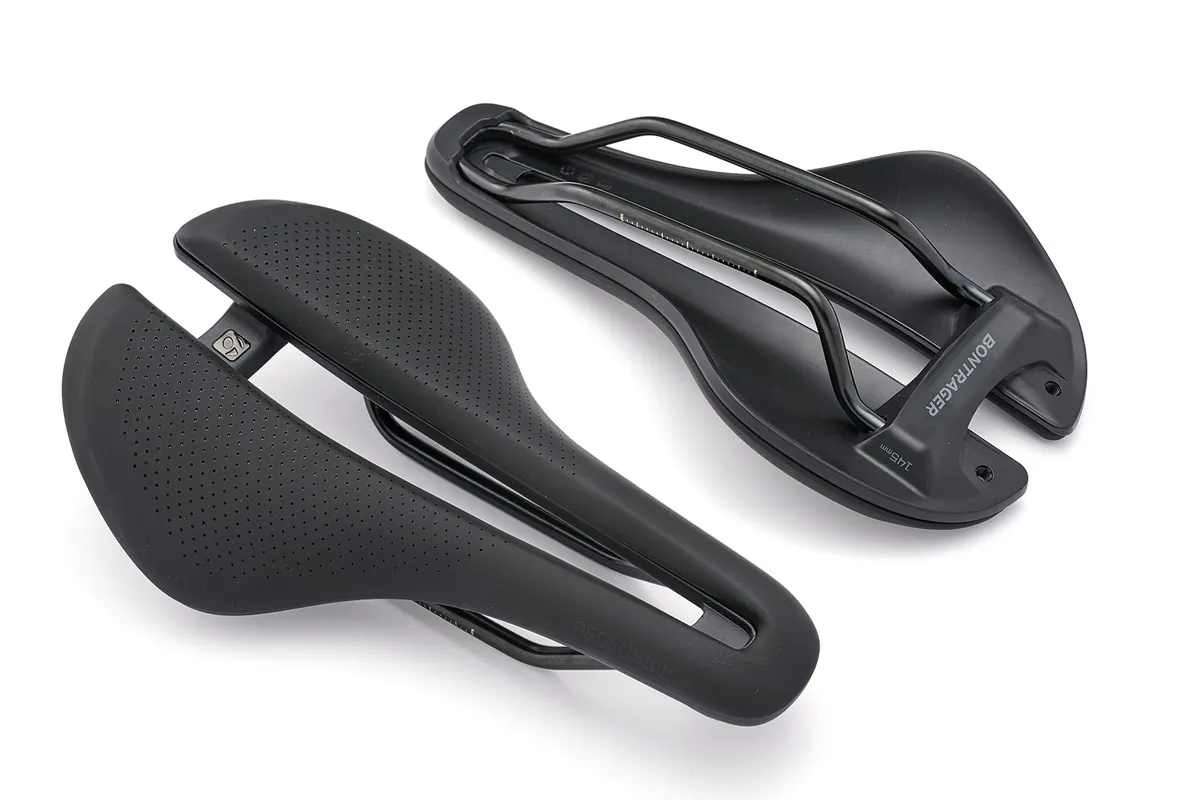
- £90 / $150 / €100 as tested
- A great option for both men and women
- Cut-out runs almost the full length of the saddle
- Generously padded
The Aeolus Elite is a short saddle with an upswept rear and a very generous cut-out, designed for competitive riders of any gender.
The padding is generous, and the shell is reasonably flexible. Our female tester found it provided a very comfortable platform, especially when riding in aggressive positions.
SQUIRREL_13115115
Selle Italia Novus Boost Evo Superflow
SQUIRREL_TEXT_13112447
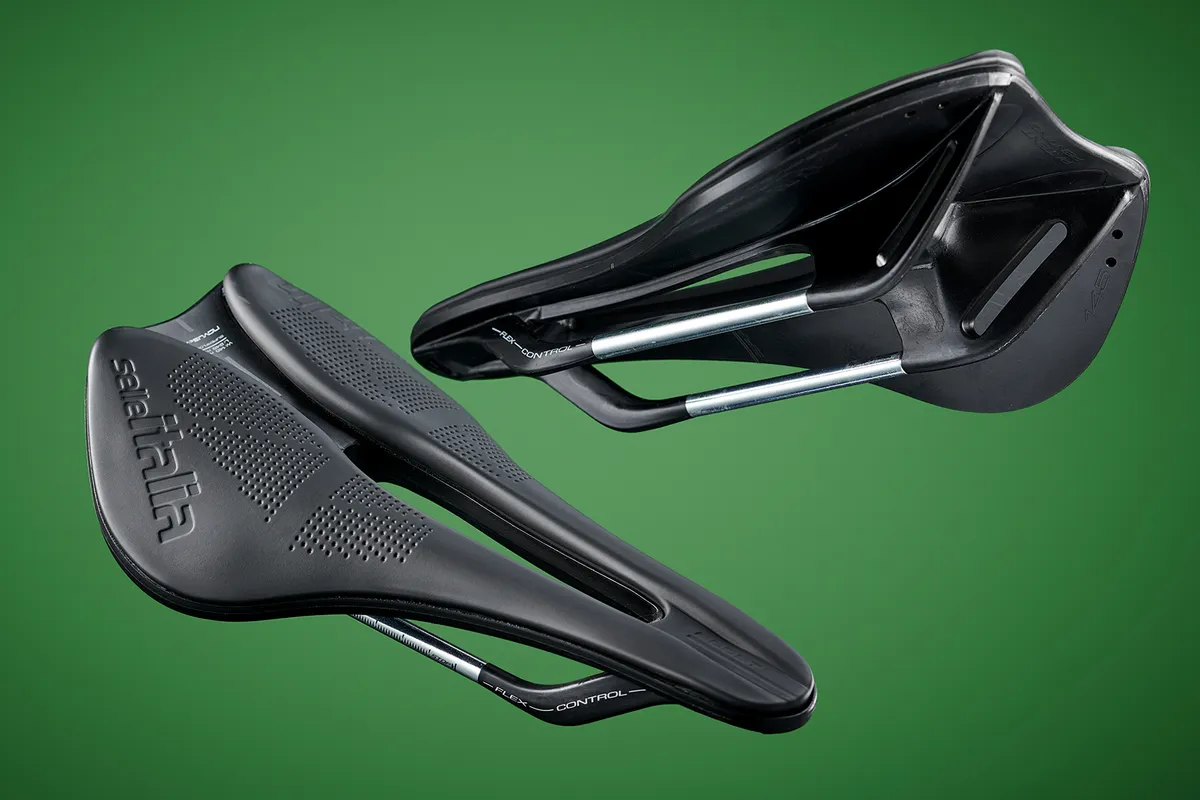
- £75 / $80 / €80 / AU$137 as tested
- Pros: Quality build; decent value
- Cons: Firm hull
Selle Italia's Novus Boost Evo Superflow is a short, comfortable saddle at a respectable weight that costs half as much as many saddles in this list.
Like these pricier models, its flat profile raises a tad towards the rear to accommodate a forward-leaning position when you're putting in effort.
The cut-out middle of the saddle takes pressure off your private parts, but the saddle tip jutting out of the padding may prove irritating.
Made of stiffer alloy instead of carbon, the saddle rails produce a less forgiving ride than pricier rivals. Still, at 247g, the Novus Boost Evo Superflow is commendably light and well cushioned for the price.
SQUIRREL_13112447
Pro Falcon CrMo
SQUIRREL_TEXT_13115116
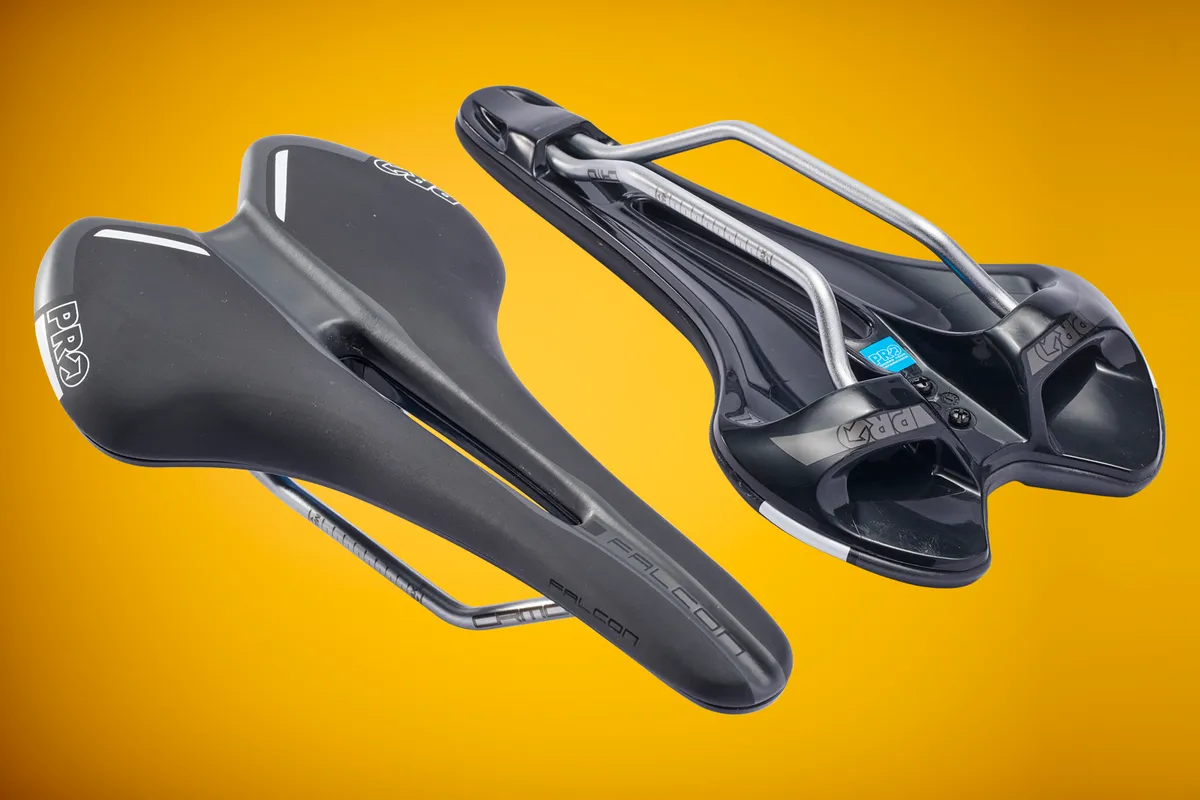
- £50 as tested
- Low weight
- Impressive value
The Pro Falcon CrMo is a classic, long, thin-nosed saddle from Shimano’s component arm. It featues a full-length pressure-relief channel that’s completely cut away in the central third.
The saddle has a flat profile, which seems to work pretty well in a more upright position or when riding a bit more aggressively. When pressing forwards, there's no undue pressure from the padded nose.
At a mere 263g and £50, the Pro Falcon CrMo is well worth the money.
SQUIRREL_13115116
Best road bike saddles for £150
Ergon SR Pro
SQUIRREL_TEXT_13076271
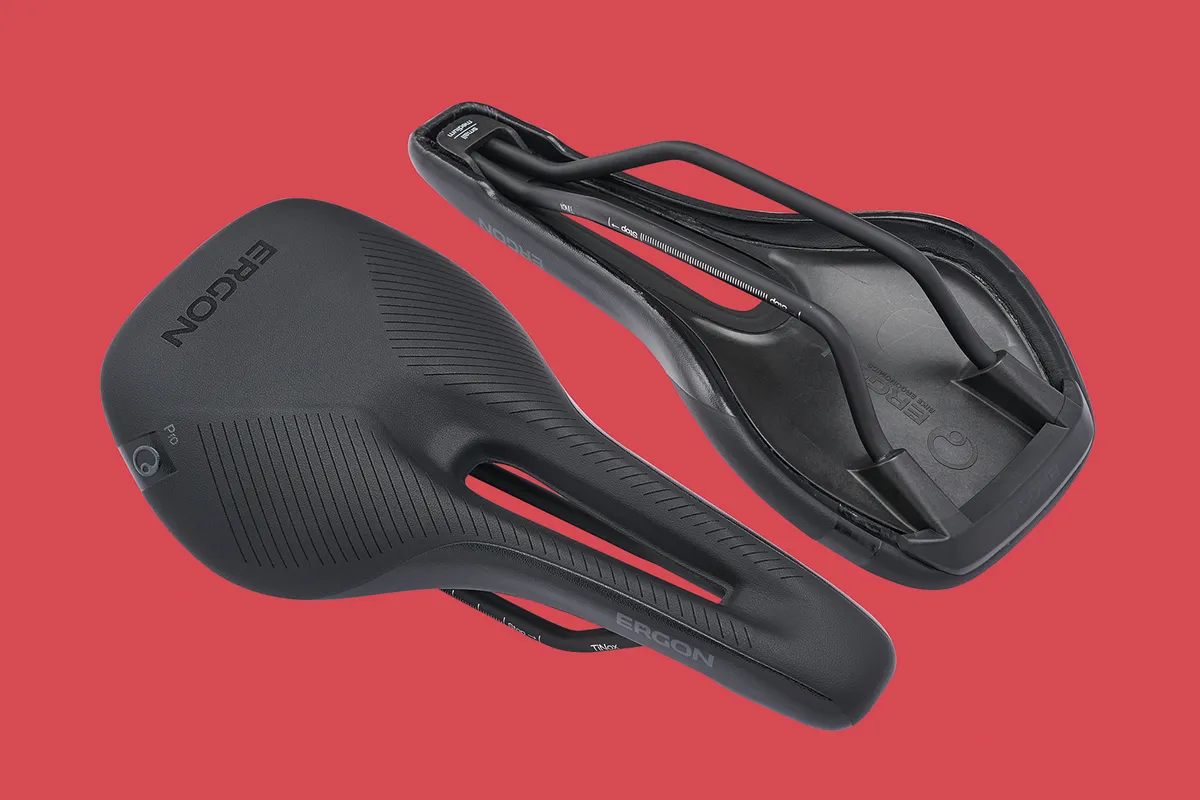
- £120 / $130 as tested
- Women’s-specific design
- Accommodates many different riding styles
- Lightweight for the price
The SR Pro is a women’s-specific saddle from Ergon. This means the cut-out is placed further forward than it would be on a men’s saddle because women tend to be more flexible at the pelvis than men.
Its nose is slightly wider than some, but this didn’t cause our tester any discomfort.
At 261mm in length, it’s also a centimetre or two longer than some ‘short’ saddles, but it still worked very well for our tester when riding in aggressive positions.
SQUIRREL_13076271
Fabric Line-S Pro Flat
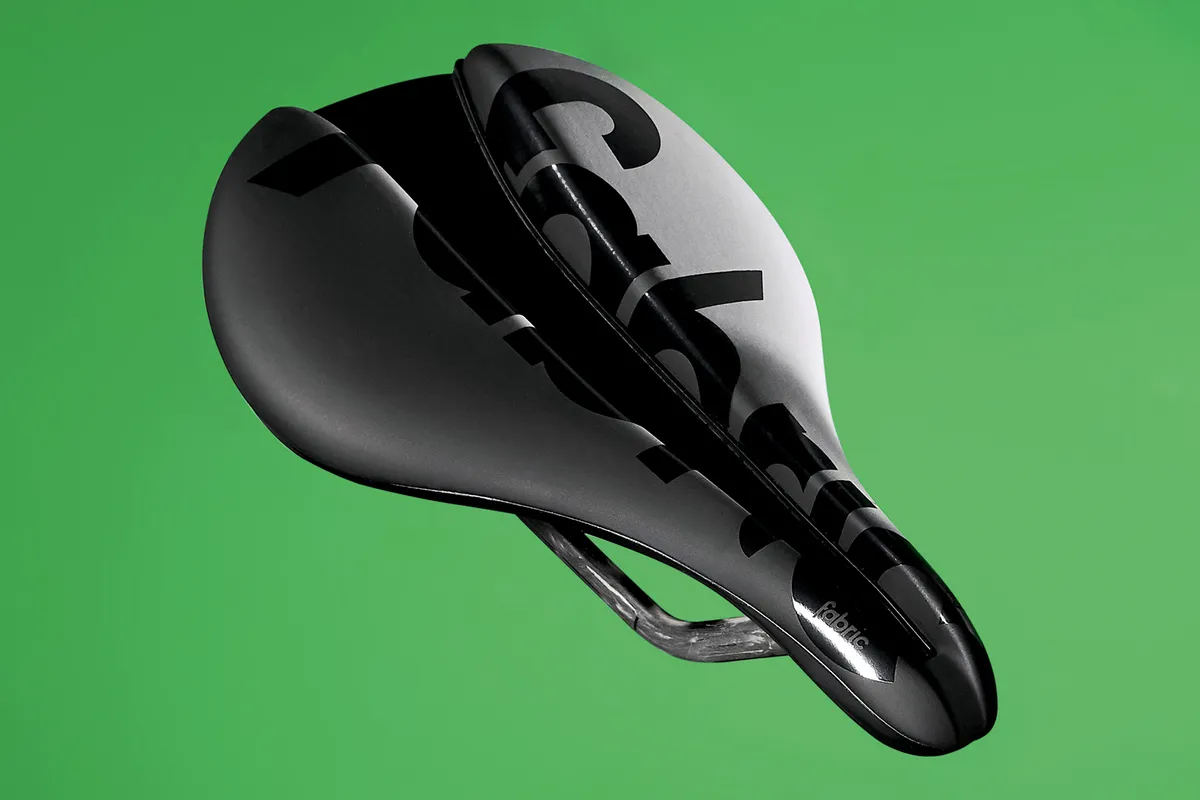
- £150 / $180 / €180 as tested
- Pros: Grippy flat saddle; light and supportive
- Cons: Getting the right position is critical
The Fabric Line-S Pro is a flat saddle optimised for pushing the pedals in the drops, yet it is also comfortable in a more relaxed, upright position.
A modest indentation in the saddle's centre keeps you securely seated but doesn't preclude adjusting your position.
The Line-S Pro's carbon construction keeps weight down to 181g in 142mm width, and it's comfortable with it. The wide nose of the saddle doesn't impede the pedal stroke and the medium-density padding provides a plush perch.
Fabric Scoop Pro
SQUIRREL_TEXT_13099604
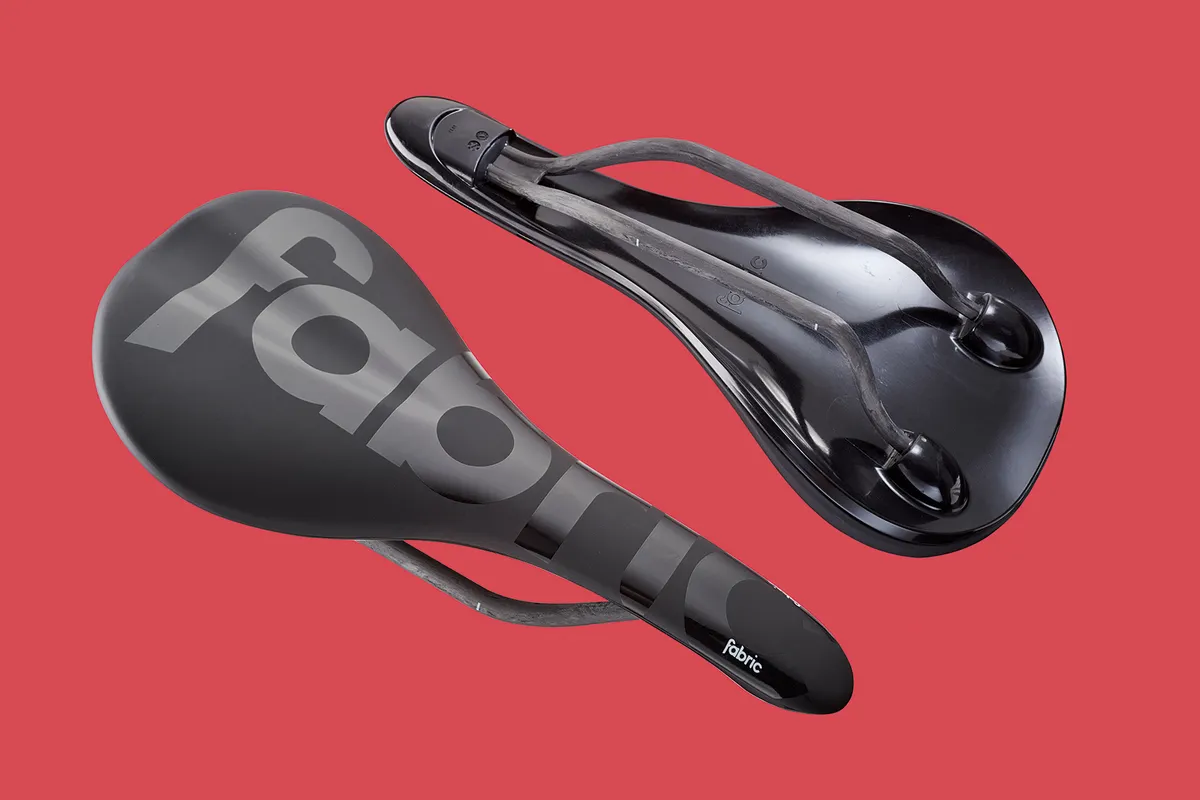
- £130 / $180 / €170 as tested
- Comfortable traditionally shaped saddle
- Range of profiles to suit different positions
The Scoop Pro is available in three different profiles, which cater to differing degrees of riding position, from upright to average and aggressive.
Its 282mm length allows plenty of room to move around and it’s well priced considering it has carbon rails that help keep weight down.
It’s traditionally shaped, with no pressure-relieving channel, but we didn’t find this affected performance. It’s a very comfortable saddle.
SQUIRREL_13099604
Fizik Tempo Argo R3
SQUIRREL_TEXT_13085531
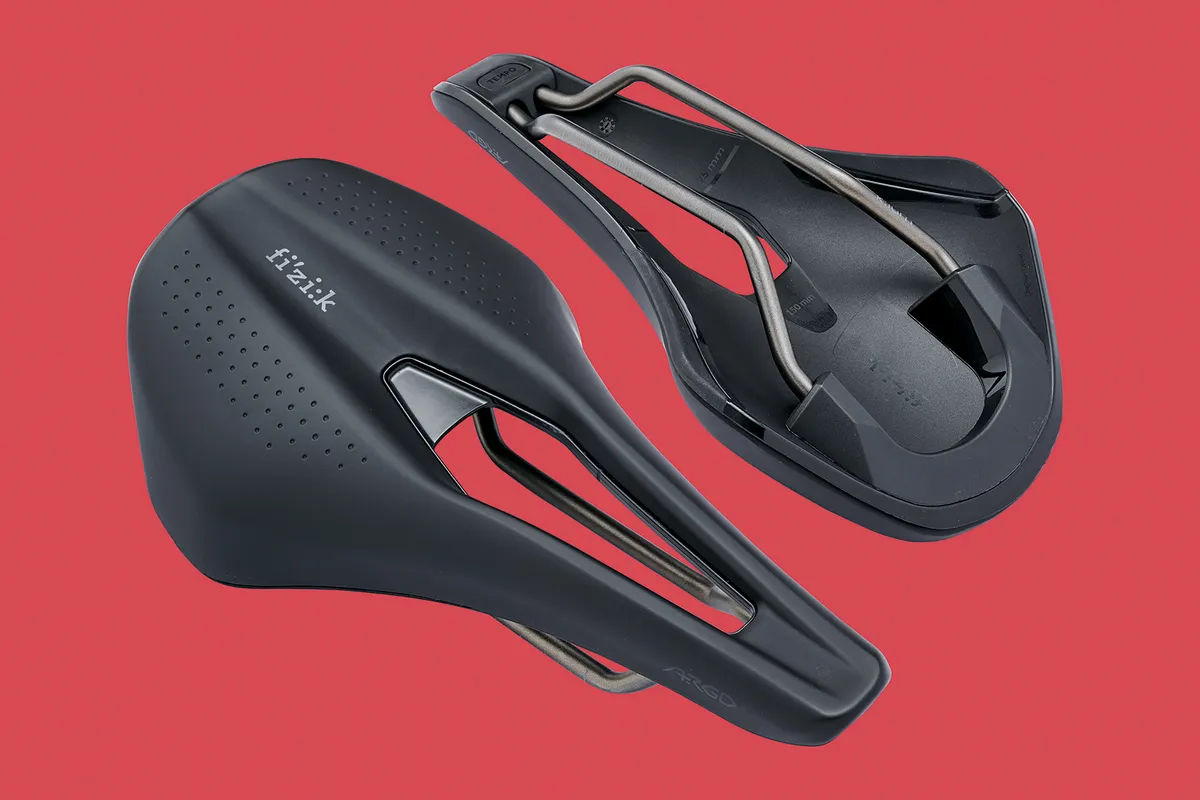
- £130 / $150 / €140 as tested
- Pros: Excellent padding and position
- Cons: Flex could be too great for some
A short-nosed saddle with a generous cut-out and a touch of extra length, the Tempo Argo is aimed at endurance riders.
It has firm, supportive padding that’s slightly thicker than Fizik’s race saddles, which is great for soaking up road vibrations.
Our tester found it offered excellent comfort levels and had enough flex in the wings to allow for natural movement.
SQUIRREL_13085531
Prologo Scratch M5
SQUIRREL_TEXT_13082241
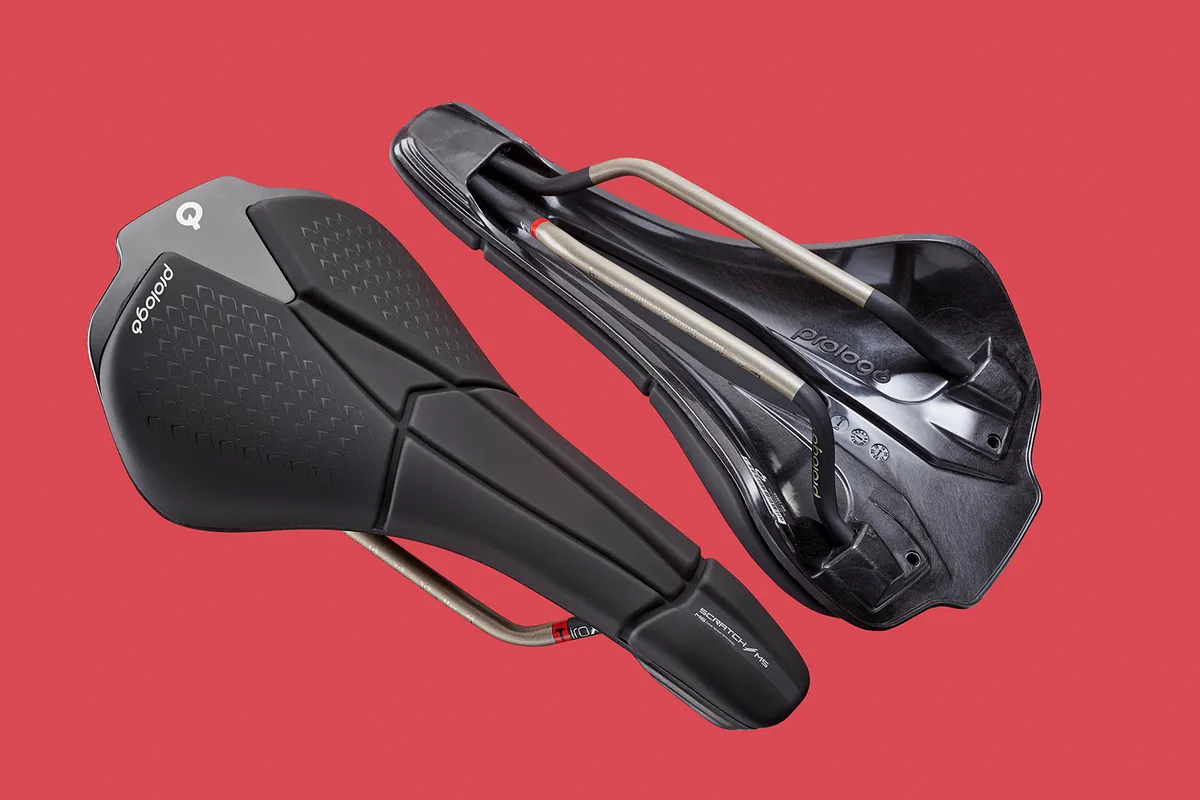
- £120 / €135 as tested
- Innovative padding
- Narrow and flexible shell means no chafing
At first glance, the Scratch M5 looks quite traditionally shaped, but in fact it’s only 250mm long. The reason for this is the relatively narrow 140mm width.
Provided this suits your sit bones, it means there’s little chance of anything rubbing your thighs and though there’s no cut-out, the padding is strategically applied to minimise soft-tissue pressure.
SQUIRREL_13082241
Selle Italia SLR Boost TM
SQUIRREL_TEXT_13085035
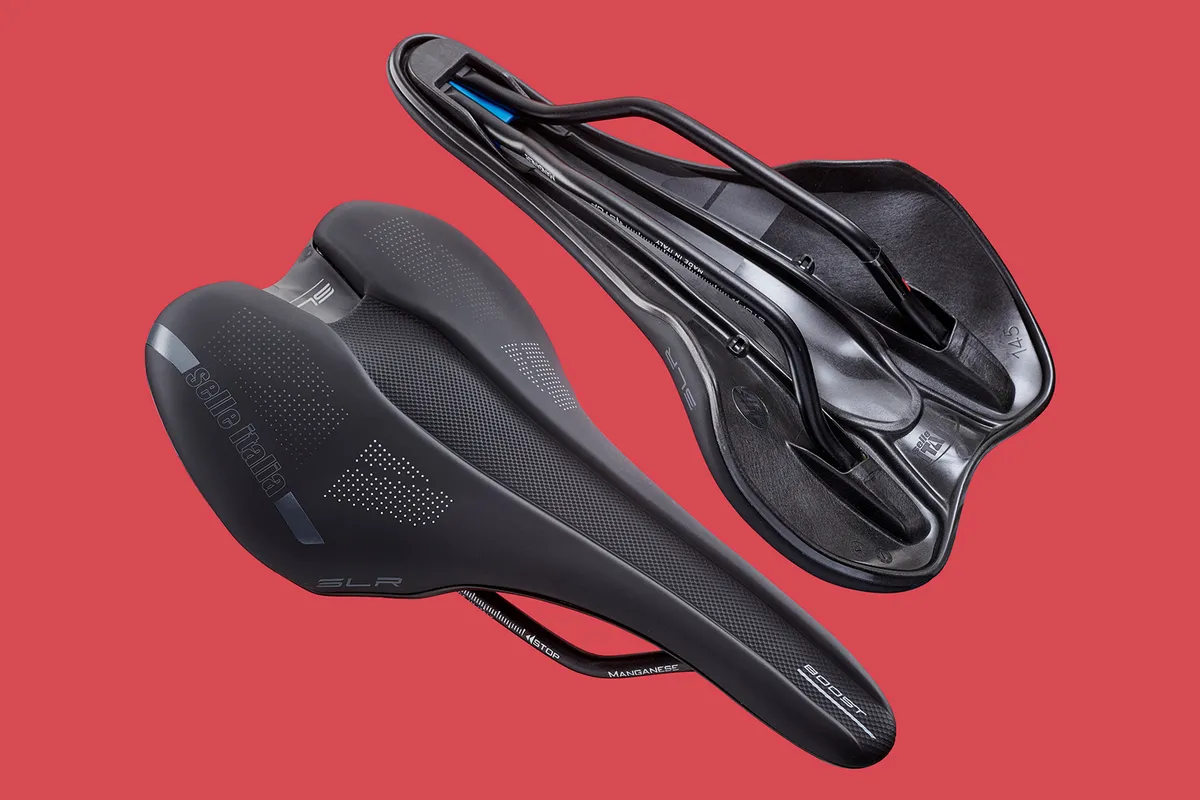
- £120 / $170 / €140 as tested
- Pros: Classic looks; effective performance
- Cons: Firm feel not for everyone
Following modern trends, Selle Italia’s SLR Boost TM is a little shorter and wider than it was previously. It’s still a relatively classic saddle though, which is reflected in the fact that it’s a firmer perch than some.
The central channel is also very shallow, but it works much better than its appearance suggests, making for a supportive, comfortable saddle, even when tucked down in an aero position.
SQUIRREL_13085035
Best road bike saddles for £200 or more
Selle Italia Novus Boost Evo 3D Kit Carbonio Superflow
SQUIRREL_TEXT_13076543
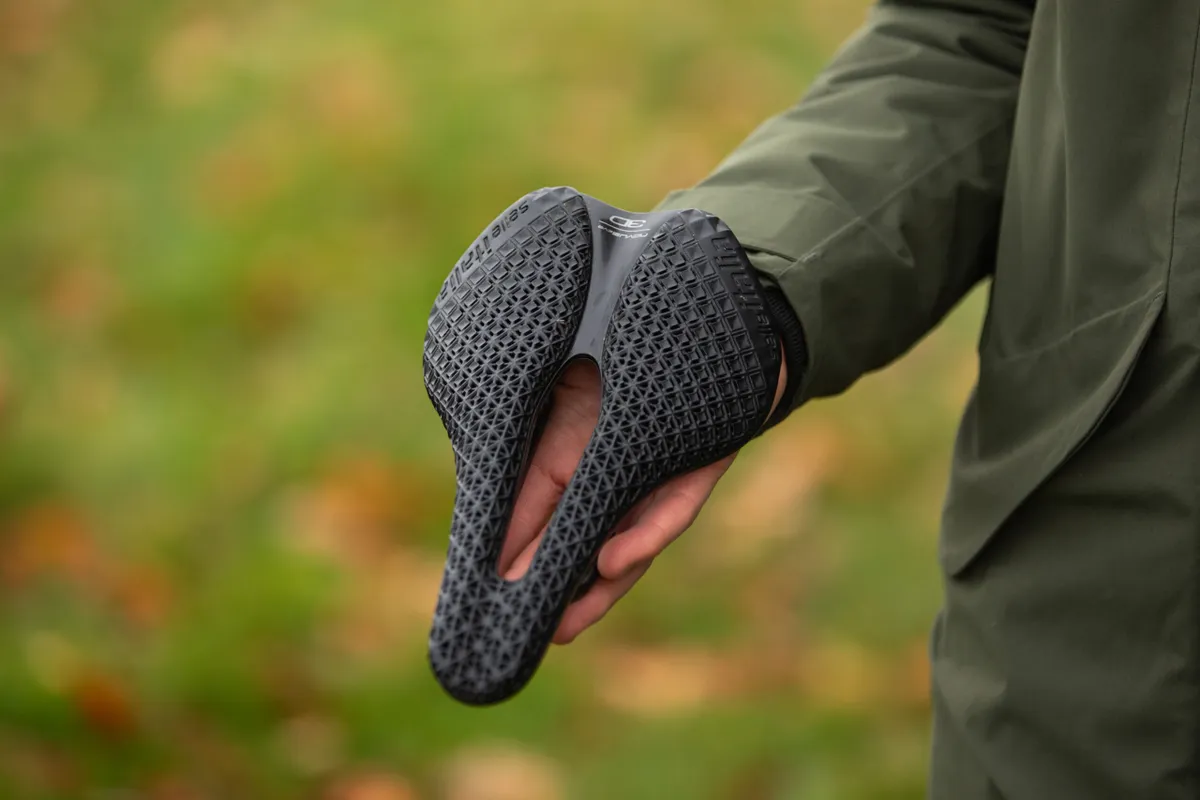
- £399 / $450 / €430
- Pros: supportive; comfortable
- Cons: Pricey
The Selle Italia Novus Boost Evo 3D Kit Carbonio Superflow has one of the longest names and the highest price of any saddle we’ve tested. But it proves to be marvellously comfortable, with a racy fit.
The 3D-printed upper uses differing densities. The firm padding on the wings supports your sit bones while the spongier nose prevents soft-tissue irritation.
The short-nose design tilts your pelvis forward, planting you in a relatively aggressive position, which may not suit more relaxed riding styles.
But if you want to ride far and fast, this saddle would be a great choice, budget allowing.
Otherwise, the non-3D-printed version costs over £300 less.
SQUIRREL_13076543
Cadex Boost
SQUIRREL_TEXT_13092202
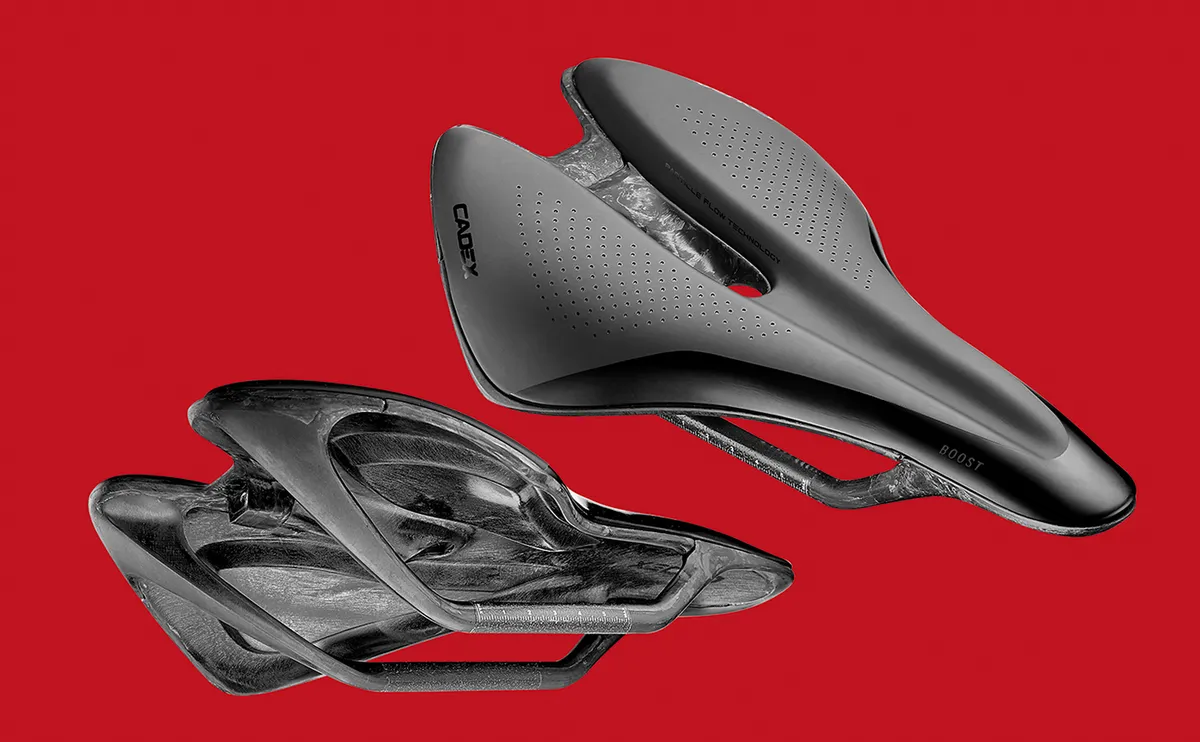
- £250 / $300 / €250 / AU$400 as tested
- Low weight
- Well padded
For a saddle weighing just 139g, the Cadex Boost is unusually comfortable owing to its padding and construction.
A standard EVA foam is augmented with ETPU (expanded thermoplastic polyurethane), an elastic material borrowed from expensive running shoes that flexes under load.
The all-in-one carbon saddle rail and saddle base design trim weight while adding compliance to dull road buzz.
The only drawback with this superb saddle is the price you'll have to pay for the privilege of riding it.
SQUIRREL_13092202
Fizik Antares Versus Evo 00 Adaptive
SQUIRREL_TEXT_13086785
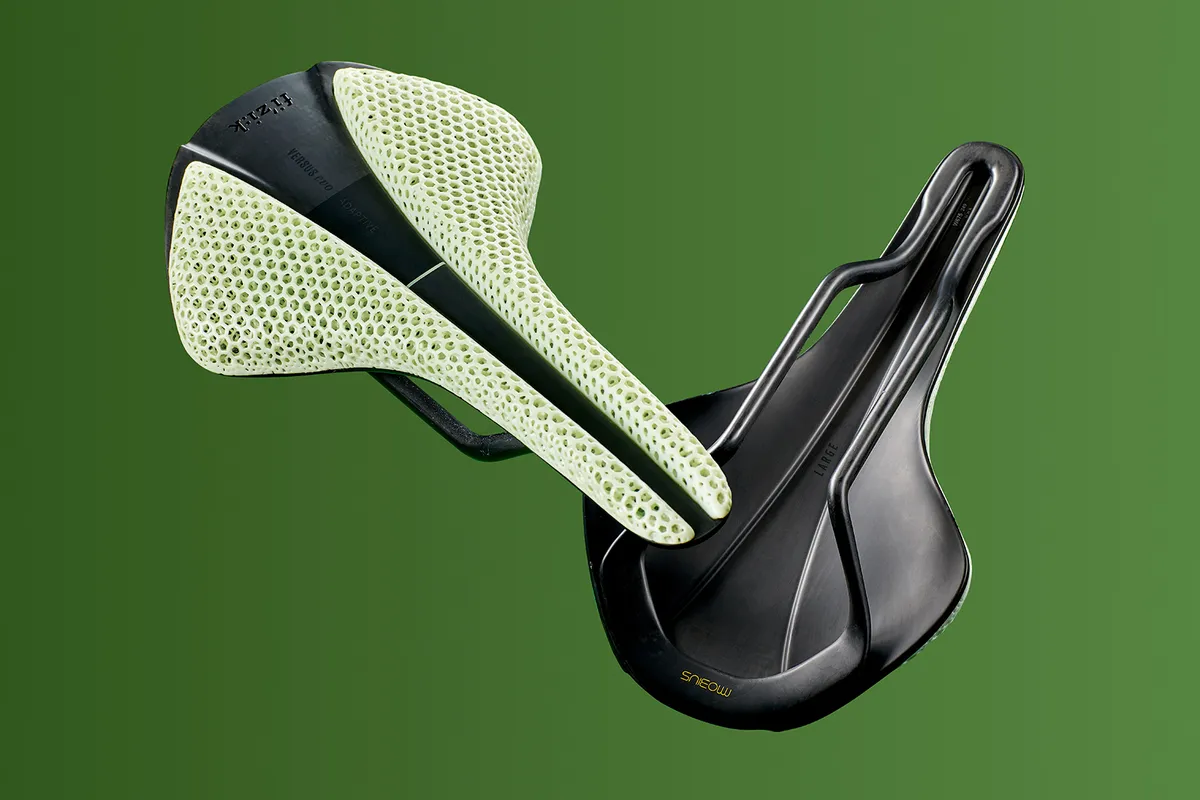
- £370 / $300 / €390 as tested
- Pros: Faultless performance
- Cons: Spellbindingly expensive
The Fizik Antares Versus 00 Evo eschews traditional saddle design, employing 3D-printed technology to leave the seat padding uncovered. Along with a top-of-the-range carbon shell and its one-piece rail, this makes for a very plush seat.
In addition, its exceptional comfort is paired with low weight (160.6g in size large). However, the Antares Versus 00 Evo loses marks for limited practicality. Grime easily penetrates into the matrix padding even in dry conditions, so it's not a saddle to ride in the winter.
No matter how comfy it is, the 3D-printed saddle struggles to justify its sky-high price tag, but Fizik does have cheaper models in the range.
SQUIRREL_13086785
Repente Latus M Carbon
SQUIRREL_TEXT_13115143
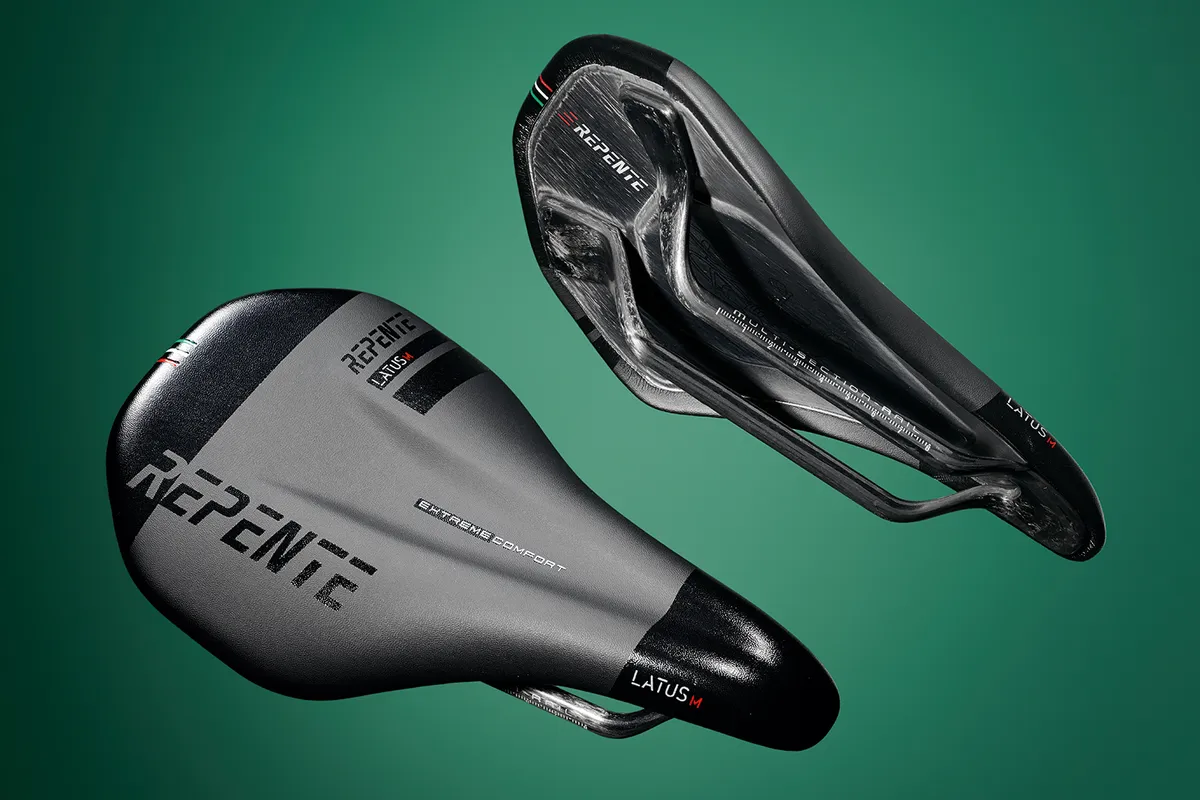
- £210 / €219 / AU$389 as tested
- Pros: Racy position; good compliance
- Cons: High price
Unlike some short saddles that angle down, the Repente Latus M has an even and broad profile with a subtle rise towards the rear for balance when seated.
The saddle's dimensions lend themselves to an advanced, aggressive position. But EVA padding provides great cushioning without excess bulk, keeping weight exceptionally low at 140g.
The Repente Latus M's best features are its carbon rails and base, which gently ease up and down while you pedal to nullify vibrations from tarmac.
SQUIRREL_13115143
Selle Italia Novus Boost Evo Kit Carbonio
SQUIRREL_TEXT_13092642
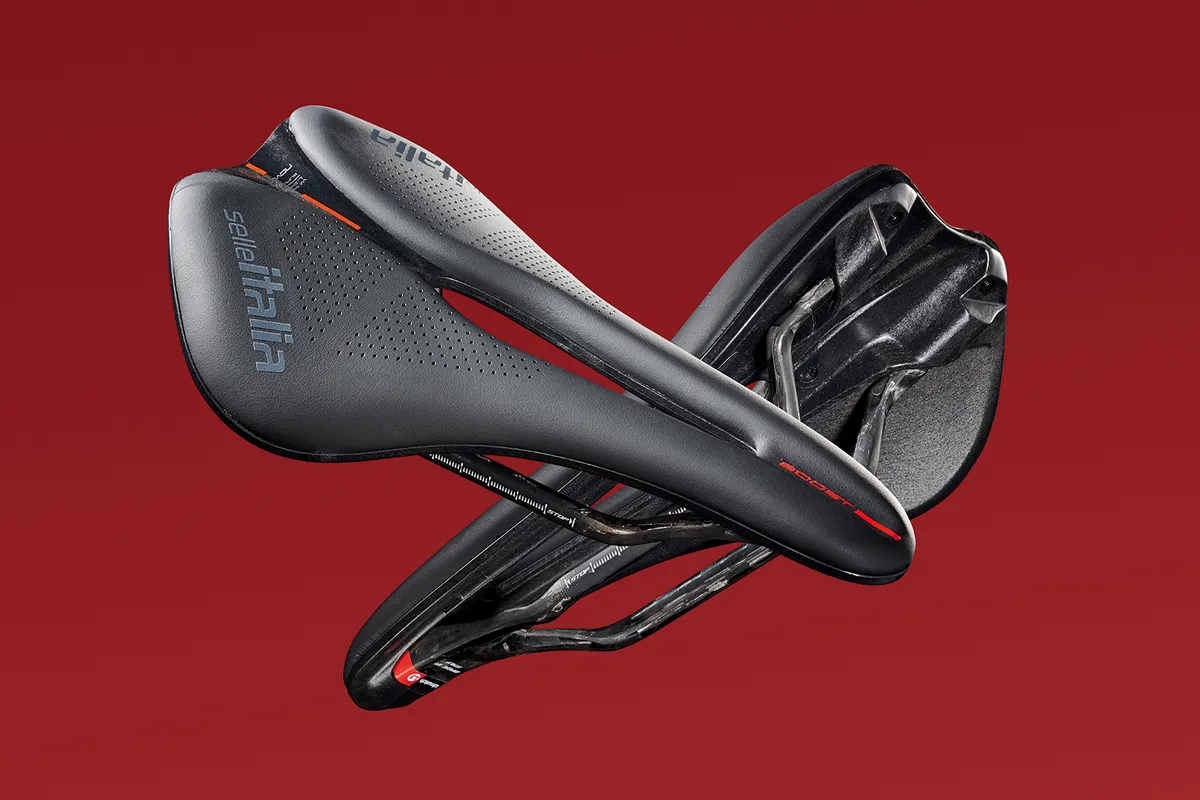
- £260 / $330 / €270 / AU$430 as tested
- Pros: Versatile; high-quality
- Cons: Questionable value
The Selle Italia Novus Boost Evo Kit Carbonio is significantly comfier and lighter than the Evo Boost, the brand's lower-level model.
But it costs at least three times as much and doesn't outperform its cheaper sibling to the same extent.
It still rides superbly, soothing road buzz and bumps well enough to be used on road and rough gravel. The padding is supportive where you need it most and its cover offers grip in the wet.
SQUIRREL_13092642
Specialized S-Works Power Mirror
SQUIRREL_TEXT_13079399
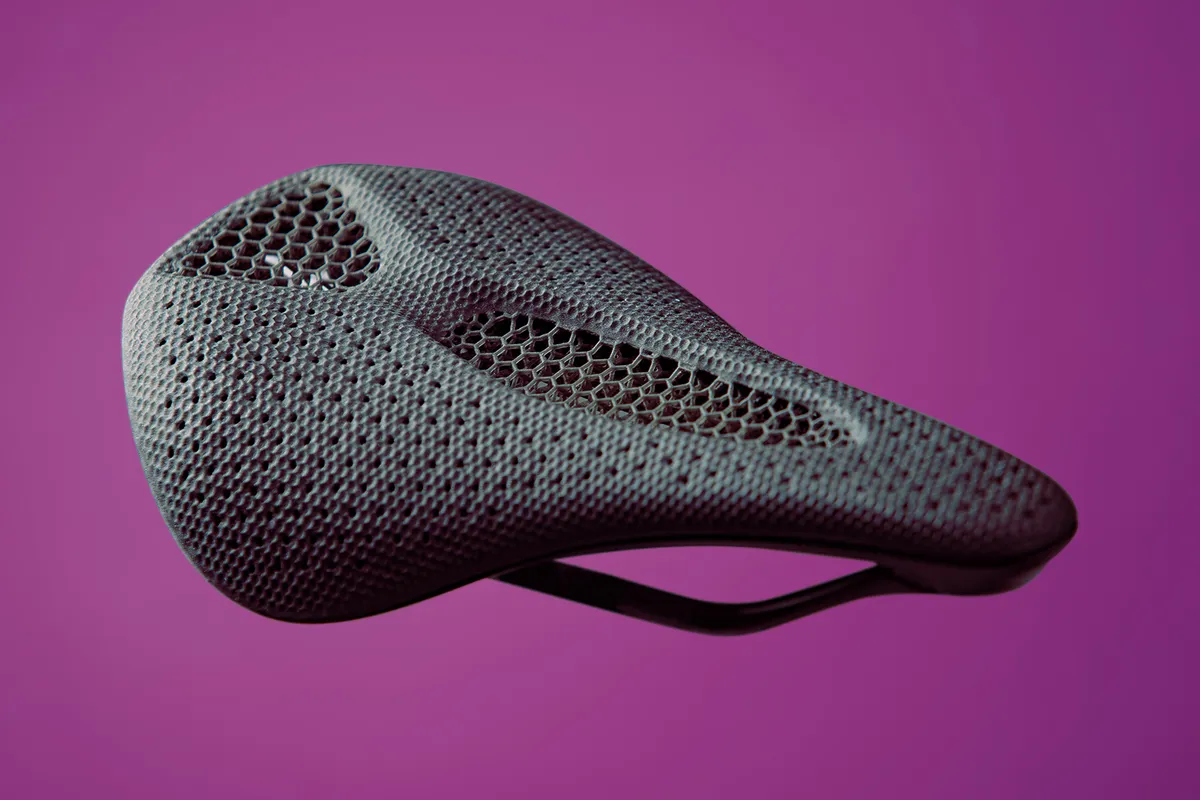
- £350 / $450 / €400 / AU$700 as tested
- Pros: Brilliant support and comfort
- Cons: Pricey and could stain
The Specialized S-Works Power Mirror boasts a similar design to the Fizik Antares Versus Evo 00 Adaptive and is as comfortable and expensive. A 3D-printed polymer matrix replaces padding used in less space-age saddles.
While this prevents any discomfort for hours on the bike and weight is respectable (188g), it certainly comes at a price. The open-matrix design will be time consuming to clean should winter muck cover the saddle.
SQUIRREL_TEXT_13079399
How we test road bike saddles
We test road bike saddles out on rides to see how they perform in the real world.
Our testers rack up plenty of miles to identify the strengths and weaknesses of each saddle.
Ultimately, our road saddle reviews are based on the following criteria:
- Comfort – how comfortable is the saddle for long durations?
- Weight – how heavy is the saddle?
- Construction – how is the saddle made, and is it durable?
- Value for money – does the saddle represent a good deal compared to others on the market?
Why you can trust BikeRadar
BikeRadar has been an authority on bikes and cycling tech since its inception in 2007, delivering the world’s best riding advice.
We have experts testing all types of bikes, parts, clothing and accessories, from road, mountain and gravel bikes to commuting, bikepacking and electric bikes.
Our reviews are always editorially independent – with no exceptions. Our reviewers comprehensively test all products in the real world, always reflecting on performance, value and the wider market when delivering their verdicts and review ratings.
We have more than 15,000 product reviews available at your fingertips, as well as expert buying, maintenance, training, skills, health and fitness advice.
Our annual Bike of the Year test is an industry benchmark and the BikeRadar team consists of some of the most experienced riders and testers in the business.
What to look for when buying a road bike saddle
Gender

It’s an unfortunate fact that most road saddles are designed with male anatomy in mind by default.
That’s not to say that a bike seat designed for men can’t work for women too, but biology means fit requirements are likely to differ.
Shape
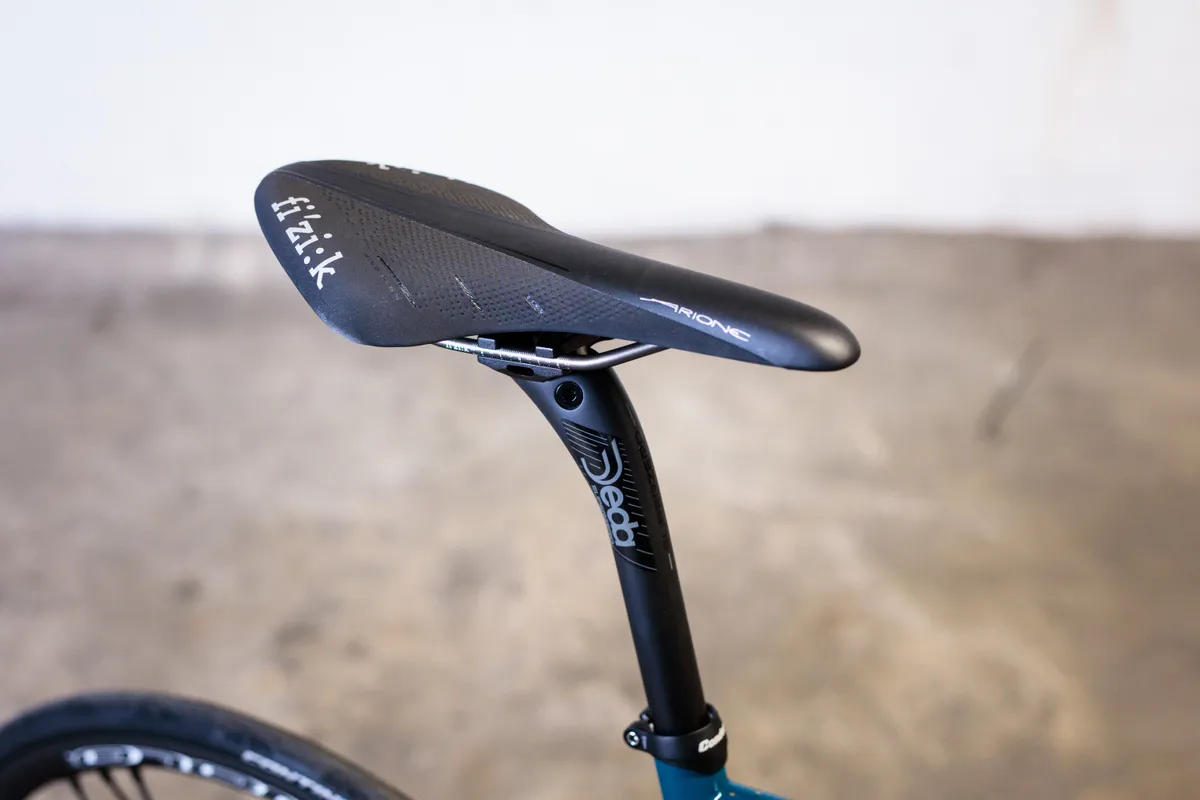
The most important difference between road bike seats is shape. Long, curved shapes such as the Selle San Marco Concor were the hot item through the eighties and nineties, then we had long and flat like the Fizik Arione in the 2000s. More recently the trend has been for short-nose saddles, such as the Specialized Power.
Personal preference will always play a big role, so ideally you want to be able to try out bike seats of different shapes before you commit to anything. That said, it’s becoming more generally accepted that for optimum comfort and performance you want to put the pressure on your sit bones and off any surrounding soft tissue.
Finding a saddle that enables you to do this is often crucial. Many of the most common types of pain caused by cycling – and not forgetting saddle sores – are linked to ill-fitting saddles.
That said, saddle discomfort isn't always a sign that you've got a 'bad' saddle – it can often be caused by other factors such as excessive saddle height and/or reach to your handlebars.
A high-quality bike fit from a reputable brand can be helpful here. All good fitters should have a sizeable range of bike seats for you to try, and can check for any other issues at the same time. You can of course go it alone, but the trial and error process can get expensive very quickly unless you beg, borrow and steal from your riding buddies.
If you’re taking part in time trials or triathlons, it’s also worth considering a saddle specifically designed for those disciplines, such as an ISM saddle. These saddles tend to feature more radical shapes and designs, all with the intention of maximising soft-tissue pressure relief while in an aggressive riding position.
Width
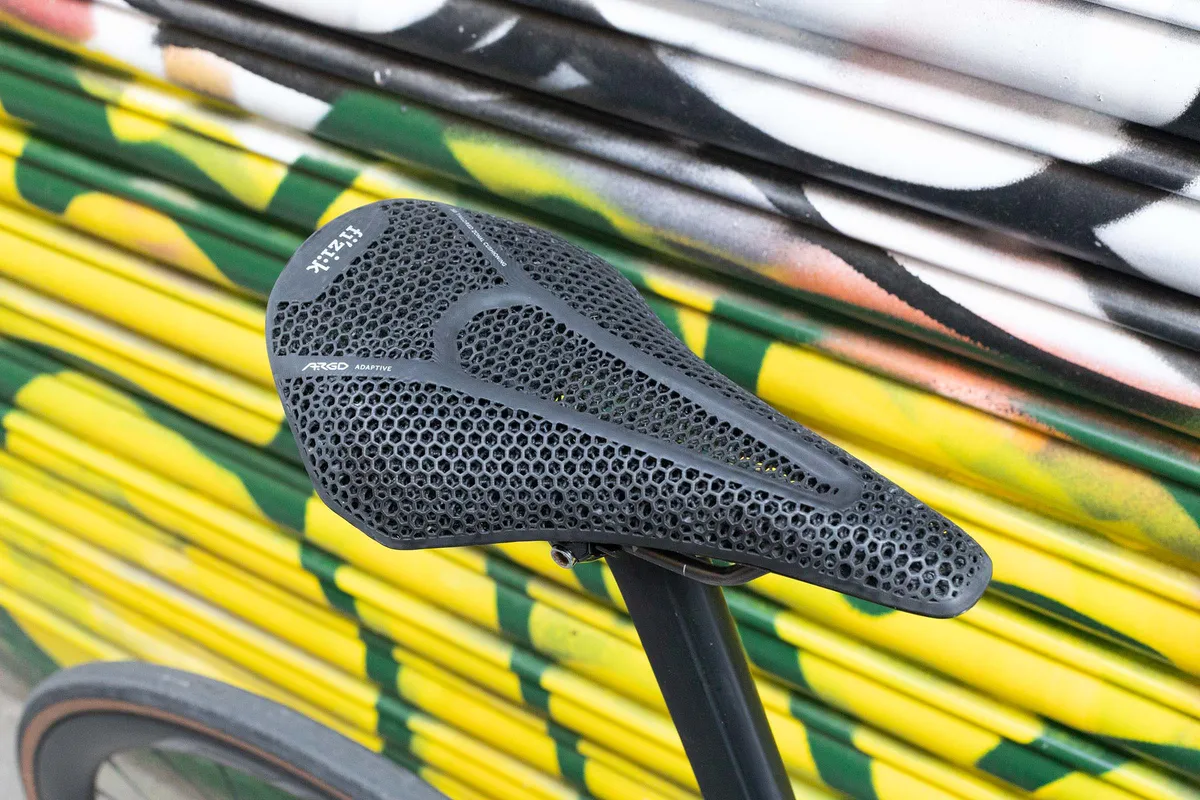
Once you’ve found a shape that works for you, the next variable to look at is width.
Some brands make a bigger deal about width than others, but no one’s anatomy is the same, so it intuitively makes sense that sit-bone width will vary between riders.
Specialized, for example, offers an in-store method of measuring the distance between your sit bones and determining the ‘correct’-width saddle you require. A comprehensive bike fit would also take this variable into account.
Length
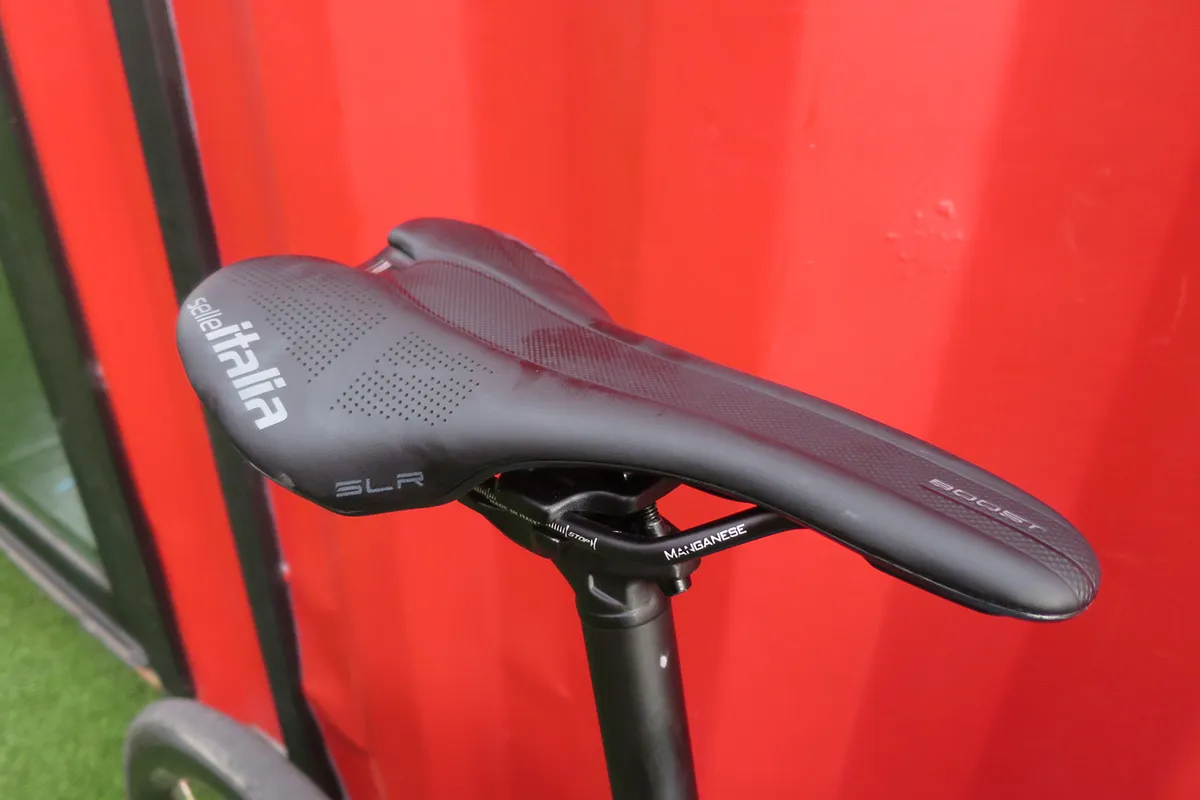
As already mentioned, the current trend is for shorter saddles that aim to fix you in a single position (i.e. with the pressure on your sit bones) while you ride.
This doesn’t work for everyone though, and there are many who prefer the extra room to move around that a longer saddle provides. Longer saddles offer the opportunity to shift your weight around, rather than keep it concentrated in one place for the duration of your ride.
This sounds great in principle. However, if you’re finding you can’t get comfortable on any saddle, and need extra length to move around and relieve the pressure on your undercarriage, there may be other fit issues at play, such as excessive saddle-to-bar drop.
In any case, if you’re suffering, it’s always worth seeking out professional advice from a reputable fitter.
Bike seat padding
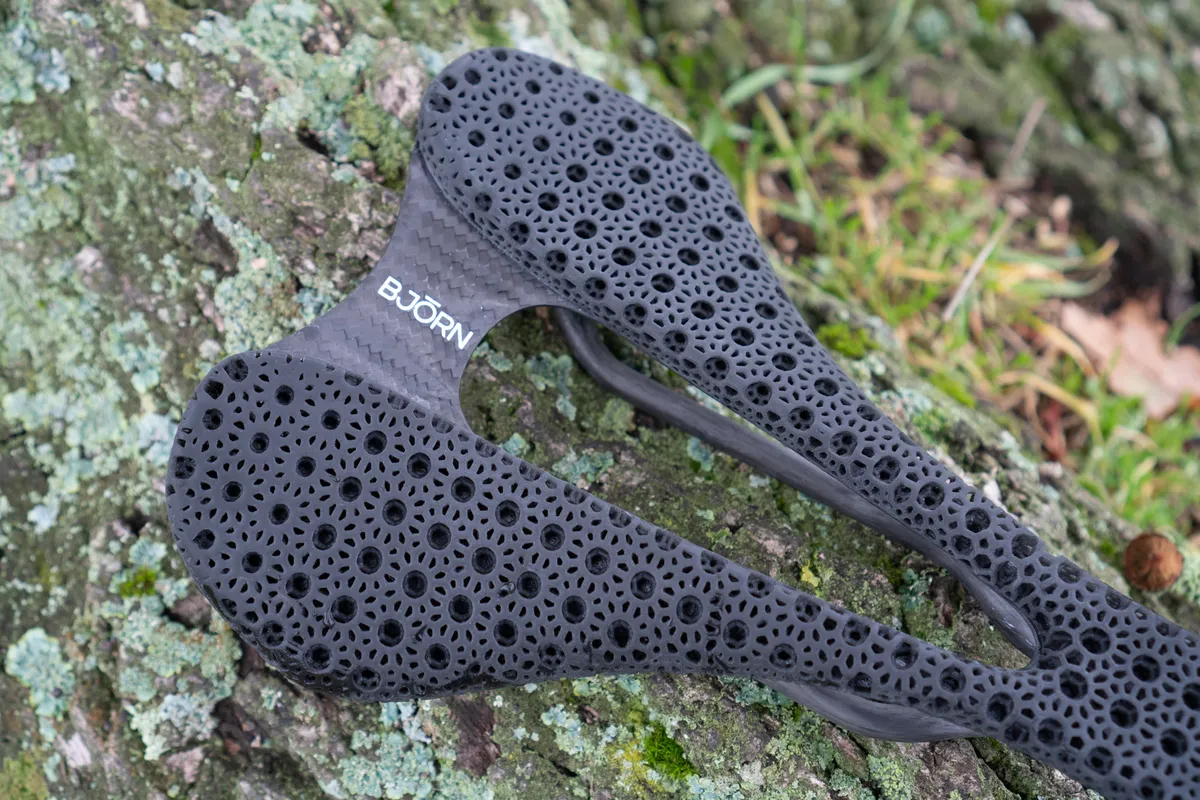
It might be counterintuitive, but when it comes to padding, less is often more. Shape is usually the biggest determinant of comfort, hence why full-carbon saddles can be surprisingly comfortable.
That said, most bike seats do incorporate some sort of padding as a method of protecting against vibrations and bumps in the road. Generally speaking, though, we would tend to recommend harder padding for road cycling because a saddle that’s too soft can often lead to an inconsistent fit over the course of a long ride.
If you’re finding pressure building up in specific areas, more often than not it’s a problem with shape or width, rather than a lack of padding.
Again, we’ll have to caveat this by saying that everyone is, of course, different and that a good bike fit is often the best way of targeting any specific issues you’re having.
Read more about bike saddles
If you want to know about bike saddles, you can check out our explainers on short-nose saddles and 3D-printed saddles.
You can also read our deep dive on how to find the right saddle for you and our pick of the best mountain bike saddles.




